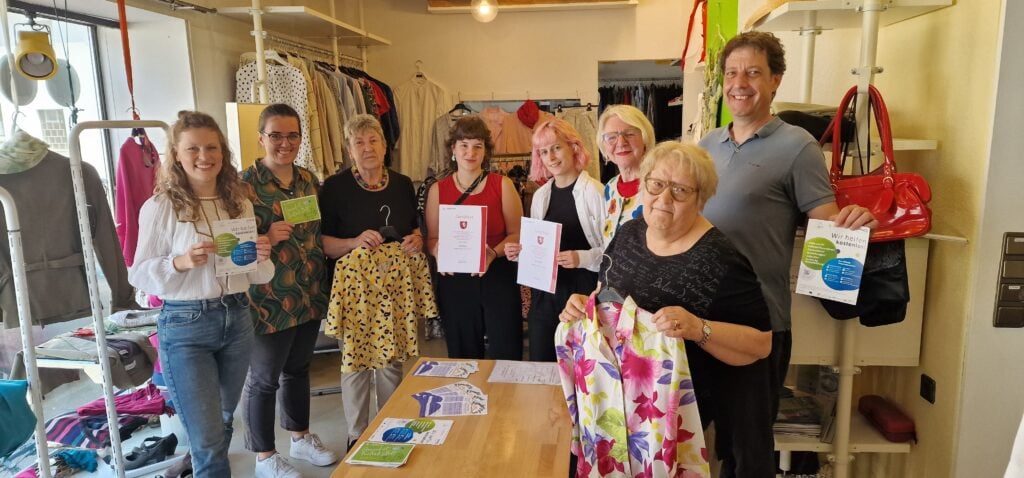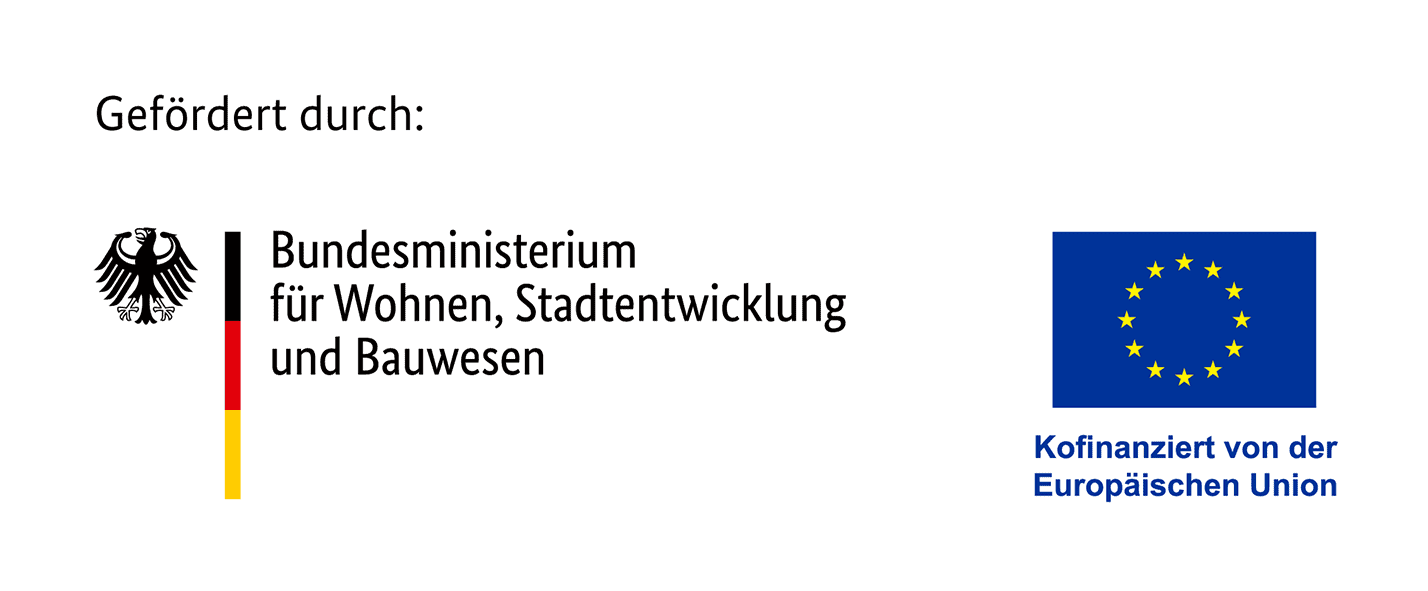On Monday, June 24, the volunteers from the second-hand clothes store of the Protestant parish of Schwäbisch Gmünd: Gudrun Oesterle-Hammer, Ursula Böhme and Isolde Weller, as well as Inga Adam, project manager of BIWAQ V, Nuru Debora Thie, coordinator for municipal development policy, Jörg Imle, Stadtteilbüro Ost, and the HfG students Inga Axelsson and Emi Eknigk met in the second-hand store at Buchstraße 32. The second-hand store has been in existence for 20 years and enriches the Oststadt. The store is a popular place to hand in clothes or buy new items at a reasonable price. From now on, the clothes will be digitally visible on Insta and reach a much wider audience, and the idea of sustainability will be strengthened many times over.
By strengthening the sustainable economy, one field of action of the BIWAQ V - ZEIT (Zeitenwandel - Einheit - Integration - Teilhabe) project is based in Schwäbisch Gmünd and supports the digitalization project. Together with two volunteer students from the Hochschule für Gestaltung, the digital switchover in the second-hand clothes store was made possible in the first place. This gave rise to the idea of supporting the second-hand clothes store with an internet and social media presence. "As a team, we thought about how we could directly and quickly support local, small businesses and then the second-hand clothes store came to mind," says Inga Adam.
The district coordinator of Oststadt, Jörg Imle, continued: "It was important to us that the support is tailored to the needs of the company and that this then creates added value for the entire district." The municipal coordinator for community development policy, Nuru Debora Thie, was also quickly involved in the "project within a project": "We already listed the second-hand store in our fair and sustainable shopping guide and now we wanted to go one step further and make the opportunities for second-hand shopping in Schwäbisch Gmünd better known." In order to put the plan of "how" to support the clothes store into practice, the project managers at the Hochschule für Gestaltung (HfG) asked whether students would have the time and inclination to design the store's website. The two HfG students Inga Axelsson and Emi Eknigk immediately got in touch: "We immediately found the idea exciting because we could present the store in a cool way, promote sustainability and use our design skills". The volunteer store team at the second-hand clothes store was also immediately enthusiastic about the idea: "It's great that the students are doing this. In this way, we hope to attract new and younger customers on a tight budget and also those who are particularly concerned about sustainability," said Gudrun Oesterle-Hammer, who runs the store together with six other employees.
The website of the second-hand clothes store can now be found on Instagram under "secondhandgmuend" with current styles and offers. The opening hours are: Wednesdays from 10 am to 12 noon and 2 pm to 5 pm, Thursdays from 2 pm to 5 pm and additionally every first Saturday of the month from 10 am to 12 noon.
The city of Schwäbisch Gmünd is one of 47 municipalities nationwide participating in the fifth funding period of the federal and EU project BIWAQ (Bildung, Wirtschaft, Arbeit im Quartier). In Schwäbisch Gmünd, the BIWAQ V - ZEIT (Zeitenwandel - Einheit - Integration - Teilhabe) project is to be implemented from September 1, 2023 to June 30, 2026, primarily in Oststadt, Hardt and Altstadt. With the two fields of action "Sustainable integration into the labour market" and "Strengthening the local economy" as well as the cross-cutting topics "Sustainability" and "Digitalization", the implementation of BIWAQ V -ZEIT in Schwäbisch Gmünd contributes to the mixing of milieus and to the reduction of labour shortages, especially in the household-related services, catering, construction and trade sectors. The project is managed by the city's economic development department in cooperation with the Office for Family and Social Affairs, the Gmünd Adult Education Center, the Technical Academy and a.l.s.o. e.V.
The "ZEIT" project is funded as part of the "BIWAQ V" program by the Federal Ministry of Housing, Urban Development and Construction and the European Union via the European Social Fund Plus (ESF Plus).

